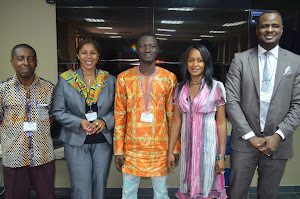BY EDMUND SMITH-ASANTE
In its effort to
improve the sustainable management of water resources, the United Nations (UN)
has conducted a survey of 130 of its member countries to assess progress made
towards the implementation of internationally-agreed approaches to the
management and use of water, known as Integrated Water Resources Management
(IWRM).
According to the UN, IWRM
is a way forward for efficient, equitable and sustainable development and
management of the world's limited water resources, which was backed by UN
Member States at the 1992 Rio Earth Summit, as part of an overall action plan
on sustainable development (known as Agenda
21).
A joint statement from
the United Nations Environment Programme and UN-Water, announcing the survey
and its outcome, said amid increasing and conflicting demands on the world’s
water supply, IWRM integrates domestic, agricultural, industrial and
environmental needs into water planning, rather than considering each demand in
isolation.
It says the latest
survey is intended to inform decision-making at the Rio+20 Conference in June
2012 which comes 20 years after the Earth Summit, adding that world governments
will once again convene in Rio de Janeiro to take decisions on how to ensure
sustainable development for the 21st century.
The survey, which was
co-ordinated by the UN Environment Programme (UNEP) on behalf of UN-Water (the
UN inter-agency co-ordination mechanism for freshwater issues), asked
governments for their feedback on governance, infrastructure, financing, and
other areas relating to water management, to gauge how successful countries
have been in moving towards IWRM.
According to the press statement, overall, 90
percent of countries surveyed reported a range of positive impacts from
integrated approaches to water management, following national reforms.
“Over 80 percent of
countries have reformed their water laws in the past twenty years as a response
to growing pressures on water resources from expanding populations, urbanisation
and climate change. In many cases, such water reforms have produced significant
impacts on development, including improvements to drinking water access, human
health and water efficiency in agriculture,” the statement said.
It however maintains
that at the same time, global progress has been slower where irrigation,
rainwater harvesting and investment in freshwater ecosystem services are
concerned.
Commenting on the
findings of the survey, the UN Under-Secretary-General and UNEP Executive
Director, Achim Steiner, said “The sustainable management and use of water –
due to its vital role in food security, energy or supporting valuable ecosystem
services – underpins the transition to a low-carbon, resource efficient green
economy.”
He stated further that “As
well as highlighting challenges, this new survey also shows important successes
regarding integrated water resources management, where a more sustainable
approach to water has resulted in tangible benefits for communities and the
environment,” adding, “At Rio+20, governments will have the opportunity to
build on these innovations and chart the way forward for sustainable
development, where the water needs of a global population set to rise to 9
billion by 2050, can be met in an equitable way.”
Other key findings of
the survey are that water-related risks and the competition for water resources
are perceived by a majority of countries to have increased over the past 20
years and domestic water supply is ranked by most countries as the highest
priority for water resources management.
Also, that the majority
of countries reported an increasing trend in financing for water resources
development, although obstacles to implementing reforms remain, while progress
on water efficiency is lagging behind other water management reforms, with less
than 50 percent of national reforms addressing water efficiency.
The UN survey shows the
major environmental changes that have taken place between 1992, when IWRM was
firstly widely backed by governments, and today – and how water resources are
managed in the face of such challenges.
For instance, the world’s
population increased from 5.3 billion in 1992 to just over 7 billion this month,
with impacts being felt most strongly in developing countries, which has been
accompanied by increased rural-to-urban migration and high refugee movements
due to climatic and socio-political disasters.





No comments:
Post a Comment